What to eat to lower your blood pressure
- Overview
What happens when you have high blood pressure?
High blood pressure and high cholesterol can damage a layer in your vascular structure called the endothelium. It’s responsible for producing and releasing nitric oxide, which helps the vessels to dilate.
In some cases, when the endothelium is damaged, not only does it not release enough nitric oxide but the nitric oxide it does release reacts with the damaged tissue, causing it to do the opposite and contract instead – right when your body needs it to dilate.
Blood pressure over time

If your blood pressure and cholesterol remain high for a number of years, damage to the endothelium can become severe enough to increase the risks of complications like angina, heart attack and stroke.
High cholesterol leads to a build-up of plaque within the lining of the endothelium. As plaque increases the lining can thin and rupture, allowing plaque deposits to flow to smaller vessels in the heart and brain. Having high blood pressure too means these deposits are even more likely to break free and cause serious issues.
Ethnicity and blood pressure
Those of South Asian or African Caribbean descent have been shown to be more susceptible to developing high blood pressure due to genetics but also factors related to the components of their traditional diet.
This highlights how the foods we eat can compound with our genetics to play a major role in blood pressure levels.
1. Eat heart healthy foods
Oily Fish (Omega 3)
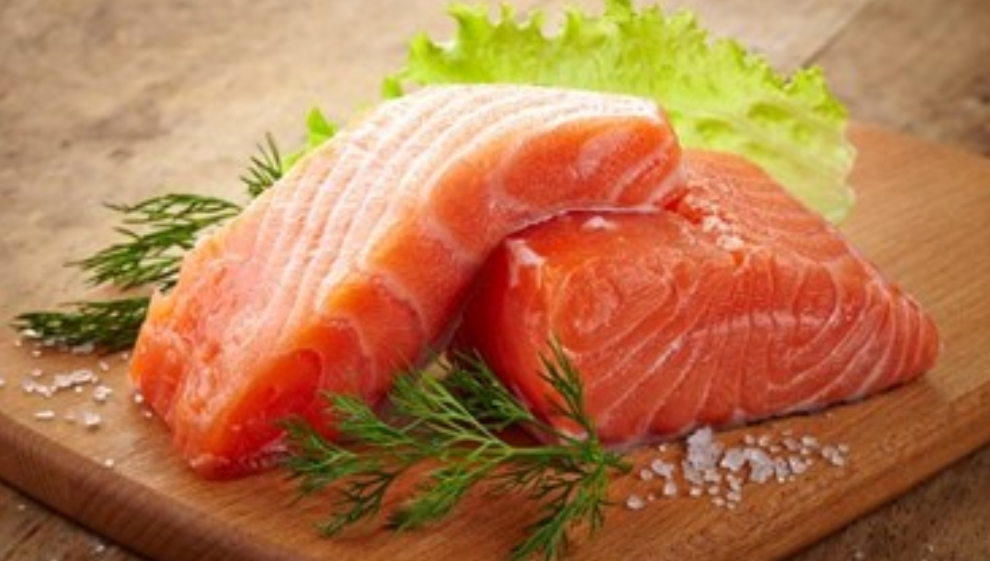
Oily fish such as trout, wild salmon, sardines and mackerel contain anti-inflammatory essential fats, also known as good cholesterol. Eat two to three times per week.
Omega-3 fatty acids contain anti-inflammatory properties which can help reduce inflammation in our blood vessels. Chronic inflammation is a common cause of high blood pressure and heart disease.
Evidence suggests that oily fish also helps prevent our blood from clotting, which improves blood flow and reduces the risk of blockages that could elevate blood pressure.
Leafy greens
Leafy greens and salads containing spinach, kale, and lettuce are packed with essential vitamins and minerals, including vitamins A, C, and K, as well as folate, potassium, and magnesium. These nutrients support various bodily functions and are great for our overall heart health.
Green vegetables are rich in potassium, which helps the body balance the negative effect of sodium (salt), which can elevate blood pressure. Adequate potassium intake is also associated with vasodilation (the relaxation of our blood vessels) and improved kidney function which both impact our blood pressure readings.
Nitrate-rich foods
Root and leafy vegetables are packed full of nitrates. The best sources to get nitric oxide from include beetroot, as well as arugula lettuce, spinach, celery and other lettuces.
It can be difficult to get enough nitrates – you need around 3.7mg per kg of body weight to make an impact (beetroot contains around 281mg per 100g), so as well as getting those on the plate, concentrated juices can help you make up the difference.
Studies show 250ml of concentrated beetroot juice per day over four weeks can reduce blood pressure levels in those with high blood pressure.
There’s strong evidence that these nitrate-rich foods and drinks promote vascular health and can have a positive impact on your blood pressure levels. Build these into your health plan alongside other good habits like picking up your activity levels and cutting saturated fats from your diet.
2. Check the labels on your food
Knowing what and how much to eat can be overwhelming. If you’re confused, using the traffic light labels on foods can be a good place to start.
Try to opt for as many green food ratings as possible. For products without a traffic light label and when comparing between products, use the value per 100g for the lowest fat, saturated fat, sugar and salt options.
The ingredients list can also be helpful. The order of the ingredients determines their amount within the food, so the foods listed first will make up the largest proportion. Additionally, if you cannot pronounce several of the ingredients included in your food, they likely contain additives which aren't going to be the best for your digestive health.
3. Eat more fruit and vegetables
Fruit and vegetables should make up just over a third of the food we eat and it is recommended to consume 5 portions of fruit and vegetables a day. However, some is always better than none.
Fruits and vegetables contain many vitamins and minerals needed for overall body health. They are high in fibre and low in calories which can help to regulate your appetite and achieve a healthy weight. Being overweight can increase your blood pressure. Fruits and vegetables are also a good source of potassium which can help to regulate fluid levels in the body and blood, helping to control blood pressure.
Every portion of fruit and vegetables that you consume reduces your risk of cardiovascular disease further. So, eating three portions will always be better than two, and five portions is always better than four. Having fruit and vegetables in your diet will provide some protection against cardiovascular disease, largely through helping to control your blood pressure.
What counts towards my 5-a-day?
It's not just fresh fruit and vegetables that count, frozen and canned options also provide one of your 5-a-day.
Frozen and canned foods are often cheaper and have a longer shelf life, helping to reduce food wastage.
Choosing canned fruit and vegetables in natural juice or water can also help you reduce your salt and sugar intake when choosing these foods.
Beans and pulses are included in your 5-a-day but only account for one portion regardless of how much you consume. Similarly, 150ml of fruit juice is a portion, but drinking more will not contribute to any more of your 5-a-day.
What's one portion look like?
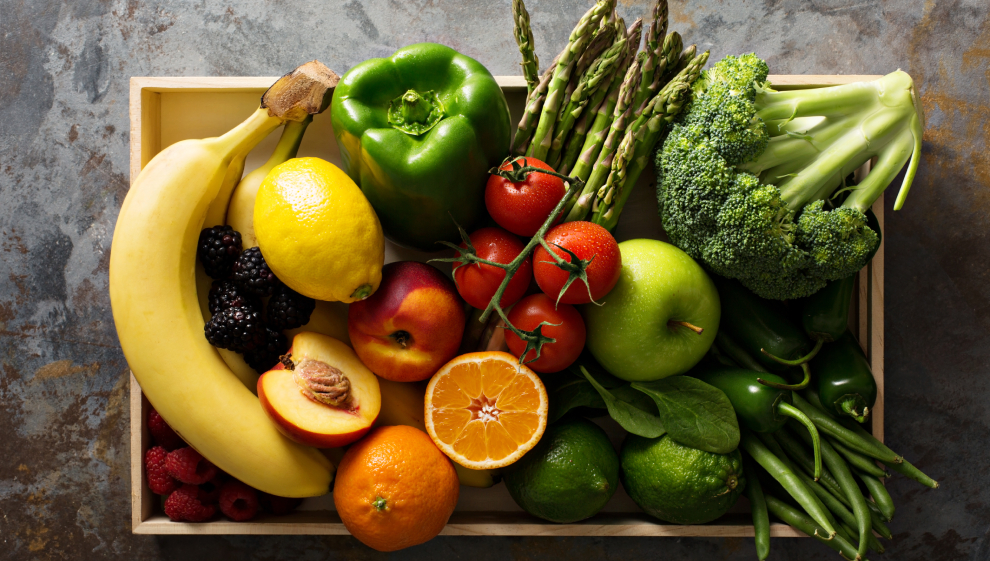
A portion is roughly 80g of fruit or vegetables. This might look like:
- 2 small fruit e.g. satsumas, kiwi, plums
- 1 medium fruit e.g. banana, apple, orange
- 1 slice of melon or pineapple
- 2 slices of mango
- 3 heaped tablespoons of cooked vegetables, pulses and beans
- 1 handful of grapes 2 handfuls of berries.
How to eat more fruit and vegetables
- Check food labels: some foods such as pasta sauces and soups include one of your 5-a-day
- Bulk out your meals with vegetables: you could add courgette, carrots and celery to spaghetti bolognese – this will also help the meal to go further and reduce the cost as you'll need less meat
- Keep your freezer stocked: frozen vegetables and fruit can easily be added to meals
- Change up your snacks: swap biscuits, cakes or crisps for fruit and vegetable sticks
- Use in season fruit and vegetables: these are often cheaper and taste better.
4. Increase your intake of vitamins and minerals
Magnesium
Magnesium is needed for muscles to relax after contraction and may help with high blood pressure. Get it from dark green leafy vegetables such as spinach, Brussels sprouts, Swiss chard; whole grains such as quinoa and brown rice; and nuts and seeds such as raw cashews, sesame and pumpkin seeds.
Antioxidants and vitamin C
Antioxidant and vitamin C-rich fruits and vegetables include carrots, asparagus, broccoli, Brussels sprouts, watercress, cabbage, tomatoes, blueberries, kiwi and kale. Here's a tip if you don’t particularly like sprouts: roast them in olive oil and add balsamic vinegar in the last 10 minutes of cooking to give them a lovely glaze. They also work well sliced in a stir fry.
Fibre
Increase your fibre. Start the day with plain, unsweetened/unsalted porridge sprinkled with ground flaxseeds, and snack on raw nuts and carrot and celery sticks. Switch all carbohydrates to whole grains such as brown rice, whole wheat pasta and quinoa. Add pulses to soups and stews, and have an extra portion of vegetables or a salad with your sandwich instead of crisps.
Celery helps blood vessels expand and helps to prevent high blood pressure. Eat four celery sticks dipped in hummus.
5. Eat less salt
Reducing your salt intake is one of the most cost effective ways to help you reduce your blood pressure levels.
We need some salt in our diet to help our kidneys regulate water in our blood. However, excess salt can draw water into the blood, increasing blood volume and blood pressure.
Foods high in salt
Even foods that are not obviously salty may contain hidden salts. Approximately 75% of the salt we consume has already been added to food before we buy it, for example:
- Cheese
- Processed meats such as bacon, sausages, ham and salami
- Crisps
- Sauces and condiments such as soy sauce, gravy, ketchup, mustard and brown sauce
- Stock cubes
- Salted and roasted nuts
- Meat pastry products
- Bread products
- Cereals
- Ready meals
- Frozen pizzas
- Pasta sauces.
How much salt should I eat?
NHS guidelines are to consume no more than 6g of salt a day (1 teaspoon).
When checking food labels, high-salt foods contain more than 1.5g of salt, or more than 0.6g of sodium per 100g, whereas low-salt foods contain 0.3g or less of salt, or 0.1g or less of sodium per 100g.
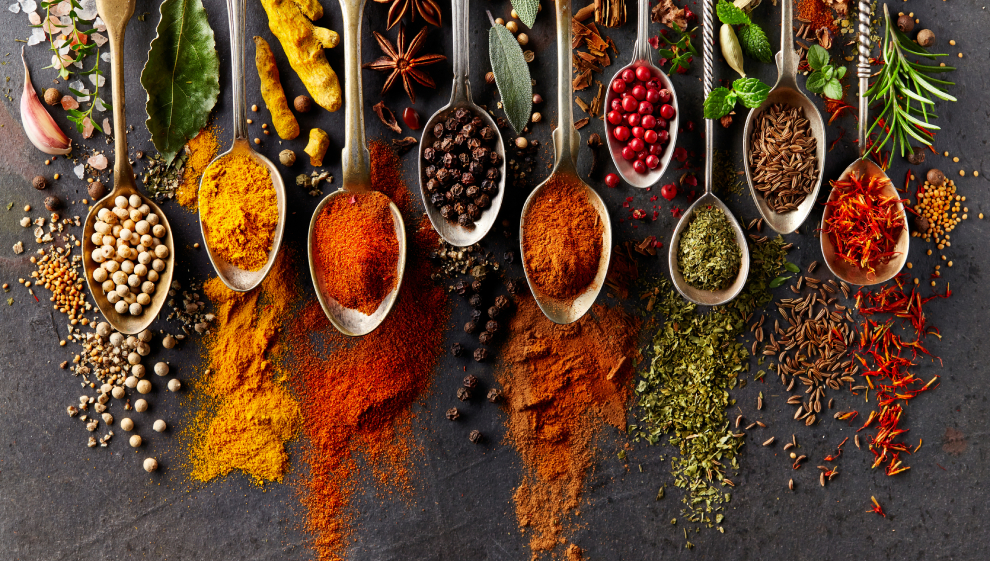
The salt content of foods can vary widely between different brands. Some food labels may state sodium instead of salt. Sodium levels will be lower as 1g of sodium is equal to 2.5g of salt.
How to reduce your salt intake
- Don't add salt when cooking
- Choose low-salt options
- Use herbs and spices to flavour food
- Use unsalted butters and spreads
- Comparing salt levels between brands
- Opting for “low salt” alternative options.
6. Introduce these superfoods
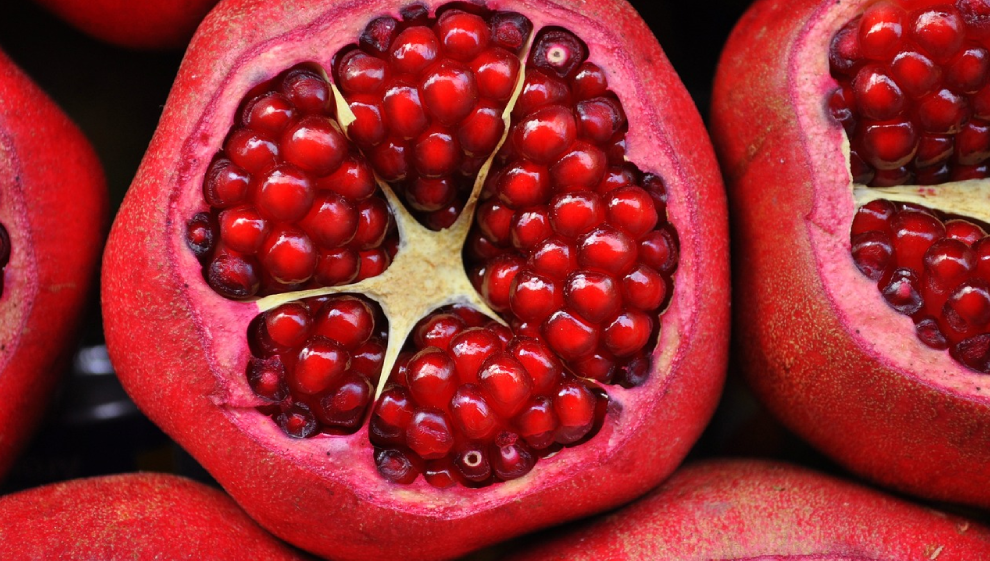
Pomegranate
Pomegranate has a number of beneficial properties that help it disrupt plaque formation in the arteries and generally improve cardiovascular health.
Stir pomegranate seeds into plain natural yoghurt and sprinkle ground flaxseeds on top. Get plenty of the benefits by drinking a small glass of pomegranate juice (with no added sugar) daily.
Beetroot
Beetroot contains nitrates which support vasodilation (the dilation of blood vessels) which in turn reduces blood pressure.
Try juicing beetroot with carrot, apple and ginger, roast it or grate it into a salad.
If you’re interested in learning more about how nitrate-rich foods like beetroot can help your body, click here to find out more.
Raw garlic
Smelly breath may be worth your while if blood pressure is a concern for you. Garlic contains allicin, a natural antibiotic, and is linked to dramatic blood pressure improvements. It needs to be raw and plentiful, so think about adding it to an olive oil and lemon juice salad dressing or stir it in at the end of cooking.
High blood pressure and cholesterol levels are a clear and present danger to your heart health. But there’s a superfood that can turn the tide.
When you run for the train or kick a ball around with your kids, your blood vessels dilate to allow for increased blood flow around your body. At least, that’s the way it should work.
7. Swap saturated fats for unsaturated fats
Fat is an essential part of our diet. Fat is important for brain health, and immune function and helps us to absorb nutrients from food. Without some fat in our diet, we cannot absorb all essential nutrients.
However, not all fats are equal and getting the right balance of fats in your diet can help to improve your heart health. Fat is also important for hormone health and we need to consider that due to naturally carrying more fat than men, women typically need more fat in their diet than men.
Saturated fats
Too much saturated fat in your diet increases your risk of cardiovascular disease. Foods high in saturated fat include:
- Red meat and processed meats such as pork, beef, sausages, bacon, ham and cured meats
- Dairy products such as butter, cheese, cream, margarine, crème fraiche
- Coconut and palm oils
- Pastries, like pies and breaded snacks
- Chocolate, cakes and biscuits
- Crisps
- Fried food and fast food.
Unsaturated fats

These fats are known as mono and polyunsaturated fats and are ‘heart healthy’ fats. These include:
- Olive oil and rapeseed oil, as well as spreads made with these oils
- Oily fish
- Avocados
- Nuts and seeds.
Opting for healthy fats over saturated and trans fats can help to improve your cholesterol profile.
This is important as the combination of high blood pressure and high cholesterol can accelerate the development of a heart attack and stroke.
How much fat should I eat?
When checking food labels, high-fat foods contain more than 17.5 g of total fat, and 5g of saturated fat per 100g, whereas low-fat foods include 3g or less of total fat, and 1.5g or less of saturated fat per 100g.
Although healthy fats are a necessary part of our diet, they are energy-dense and it's important to be mindful of portion sizes to prevent weight gain and increases in blood pressure.
How to reduce your intake of saturated fats
- Cook with olive oil instead of butter
- Bake, grill or steam foods instead of frying
- Swap creamy and cheesy sauces for tomato-based sauces
- Snack on a handful of nuts instead of a bag of crisps
- Freshly prepare foods instead of buying fast food.
How to include more healthy fats
- Peanut butter with your morning porridge
- Avocado with your lunchtime salad
- A salmon fillet for dinner
- Greek yoghurt for a snack.
8. Eat less sugar
Eating too much sugar can lead to weight gain, an increase in blood pressure and a greater risk of heart attack or stroke.
Sometimes it can be confusing when looking at the carbohydrate content of food, as some healthy foods can be high in carbohydrates and therefore sugars.
We should aim to get most of our carbohydrates from starchy foods, fruit and vegetables, and limit our intake of free sugars.
What are free sugars?
Free sugars are sugars added to foods such as in biscuits, cakes, sweets and drinks. They also include naturally occurring sugars in honey and syrups.
Fruit and milk contain natural sugars so aren't counted as free sugars, and are considered healthier options. However, once the fruit is juiced or incorporated into a smoothie, it becomes a free sugar.
How much sugar should I eat?
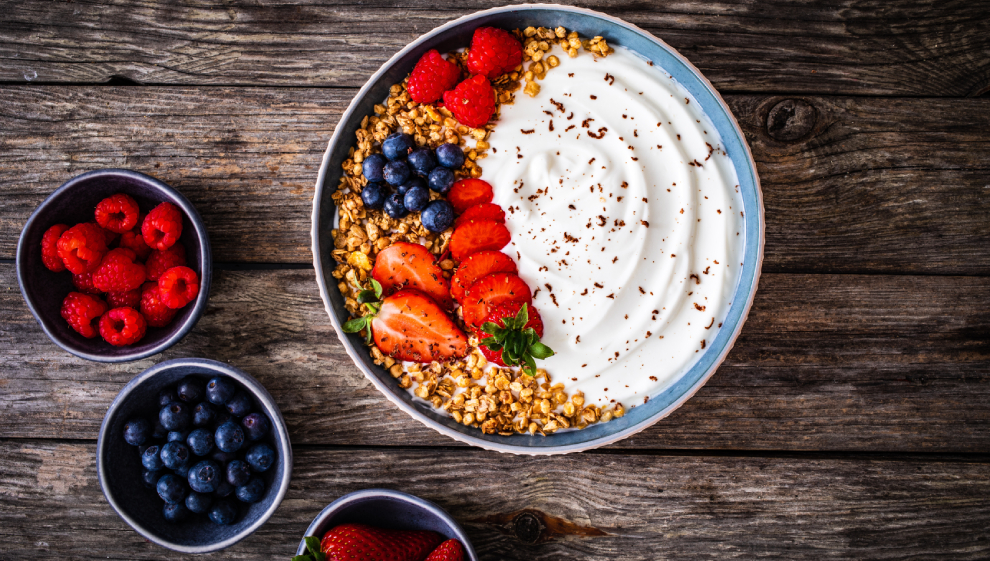
A maximum of 30g of free sugars should be consumed a day (about 7 teaspoons or sugar cubes). This can add up very quickly through sweet snacks, soft drinks, fruit juices, alcohol, condiments, ready meals, jams and preserves.
When checking food labels, the ‘carbohydrates of which sugars’ value includes the total sugar content of the food, including free sugars and those naturally occurring in yoghurt, fruit and vegetables.
High sugar foods are those which contain more than 22.5g of total sugars per 100g, while low sugar foods are those which contain 5g or less of total sugars per 100g.
It's important to look at the total sugar content of foods but it's equally as important to be able to determine the healthier options by looking at which foods contain less free sugars, even if the total sugar content is the same.
For example, a food which is made with fruit or milk will be a healthier choice than a food with a high sugar content without fruit or milk.
How to eat less sugar
- Swap to sugar-free squash and diet drinks
- Gradually reduce the amount of sugar you add to food and drinks, and over time your body will get used to this
- Choose breakfast cereals without added sugars – those that aren't frosted or coated in honey or chocolate
- Snack on fruit or vegetables rather than confectionery
- Reduce the sugar you add when cooking
- Cook from scratch to reduce hidden sugars in foods.
Last updated Friday 19 January 2024
First published on Wednesday 18 January 2023

